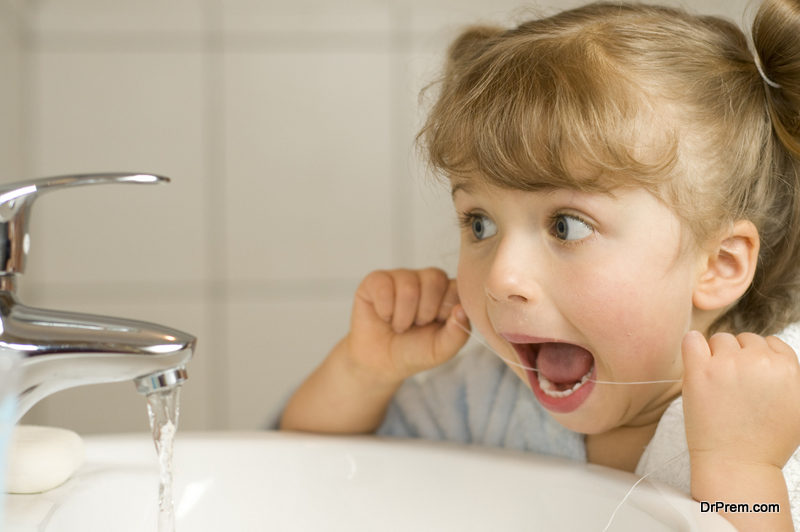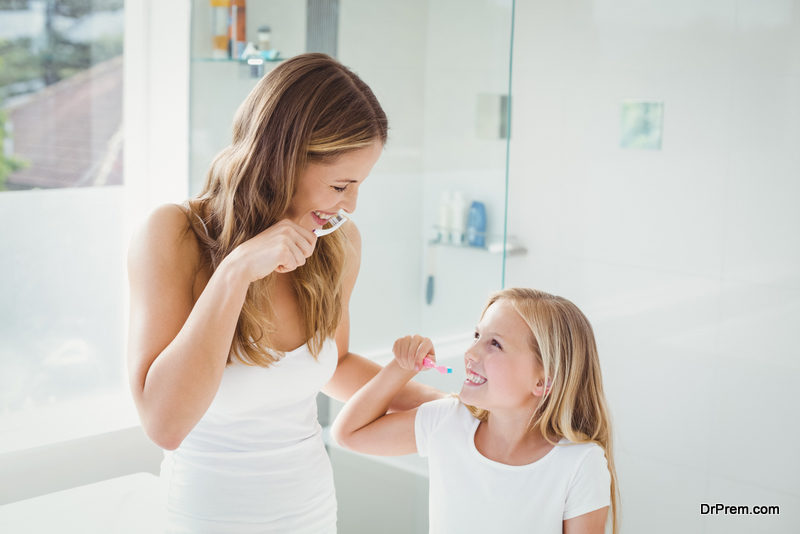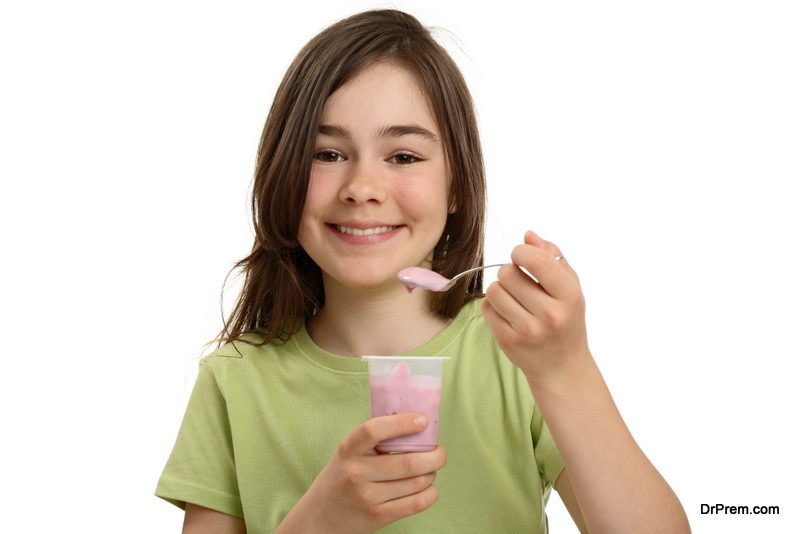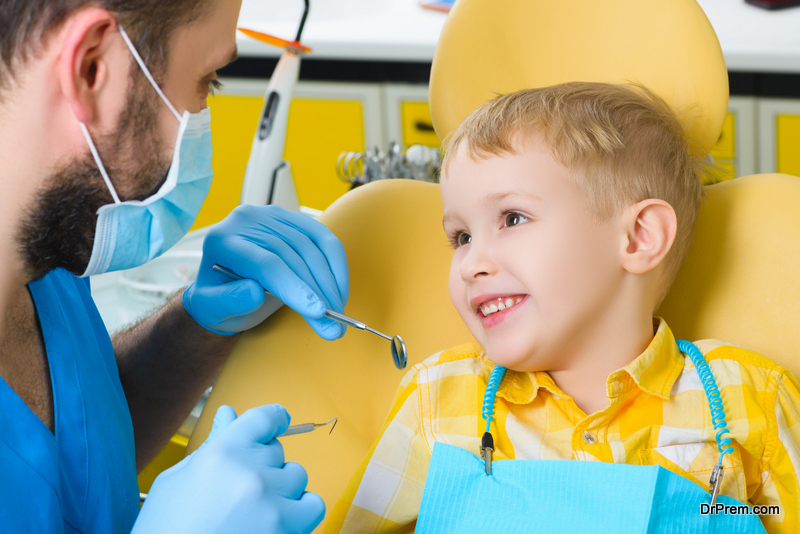Eat your vegetables. Clean up your toys. Go to bed. These are all phrases parents have uttered countless times! And another to add to the list? “Brush your teeth!” For many kids, brushing their teeth seems like a tedious and unimportant task. But as parents, you know that couldn’t be farther from the truth. Good dental hygiene starts at a young age with good habits. But what oral health tips are most important for kids? And when should you start? Keep reading to learn how to promote good dental hygiene at a young age, so that your children will have healthy pearly whites well into adulthood.
1. Brush, Floss, Fluoride
 Let’s start with the basics. Your child should be brushing their teeth every morning and every night. This starts from the moment your infant breaks their first tooth — although the method and tools vary by age. Little ones (under the age of 3) should use toothpaste that is safe to swallow. Before the age of 3, it’s difficult for kids to understand the concept that what they put in their mouth shouldn’t be swallowed (especially if it tastes good). Use a soft-bristled brush to gently brush your child’s teeth in small, circular motions. As your child gets more accustomed to this routine, let them help! The toothpaste you use might include fluoride, but your dentist might also recommend a fluoride rinse. Fluoride helps strengthen and protect the tooth’s enamel. Flossing can be a little tricky for kids, so be sure to take the time to show them the proper technique. Don’t be surprised if their gums bleed slightly or they wrap the floss too tightly around their fingers the first few tries. In time, they’ll become more comfortable with the motion. Floss together at night as a family! Flossing helps remove food and other bacteria that collects between teeth and out of reach of most toothbrushes.
Let’s start with the basics. Your child should be brushing their teeth every morning and every night. This starts from the moment your infant breaks their first tooth — although the method and tools vary by age. Little ones (under the age of 3) should use toothpaste that is safe to swallow. Before the age of 3, it’s difficult for kids to understand the concept that what they put in their mouth shouldn’t be swallowed (especially if it tastes good). Use a soft-bristled brush to gently brush your child’s teeth in small, circular motions. As your child gets more accustomed to this routine, let them help! The toothpaste you use might include fluoride, but your dentist might also recommend a fluoride rinse. Fluoride helps strengthen and protect the tooth’s enamel. Flossing can be a little tricky for kids, so be sure to take the time to show them the proper technique. Don’t be surprised if their gums bleed slightly or they wrap the floss too tightly around their fingers the first few tries. In time, they’ll become more comfortable with the motion. Floss together at night as a family! Flossing helps remove food and other bacteria that collects between teeth and out of reach of most toothbrushes.
2. Annual Dental Check-ups
Your child should first see the dentist between the ages of 3-5. This is when most of their baby teeth are grown in. Dentists can get a good idea of your child’s dental structure at this point. It also introduces the dentist to your child in a non-threatening way. Pediatric dentists are specifically trained in creating an enjoyable experience for new patients. The dentist will check and clean your child’s teeth. The cleaning should take no more than 30 minutes and most offices reward good behavior with a small prize! As your child’s baby teeth start to fall out and their adult teeth come in, the dentist will get a better picture of how your child’s teeth will eventually fill in. Will they have an overbite, overcrowding, or other issues that require a palatal expander or braces? If so, your dentist might refer you to an orthodontist where you can discuss options like invisible braces.
3. Lead by Example
 Whether or not you realize it, your children idolize you. They look to you for comfort and an example of how they should act. They mimic your behavior in hopes of gaining approval for doing the right thing. One of the best ways to promote dental hygiene in your children is to practice it yourself! That means not skipping dentist appointments or brushing before bed because you’re “too tired”. Brush your teeth together in the morning and again at night. Floss together and avoid things that stain your teeth like coffee or smoking cigarettes. Of course, your little one won’t be engaging in these behaviors now, but the example you set can greatly impact their life choices moving on.
Whether or not you realize it, your children idolize you. They look to you for comfort and an example of how they should act. They mimic your behavior in hopes of gaining approval for doing the right thing. One of the best ways to promote dental hygiene in your children is to practice it yourself! That means not skipping dentist appointments or brushing before bed because you’re “too tired”. Brush your teeth together in the morning and again at night. Floss together and avoid things that stain your teeth like coffee or smoking cigarettes. Of course, your little one won’t be engaging in these behaviors now, but the example you set can greatly impact their life choices moving on.
4. Make it Fun
Is there a favorite song or nursery rhyme you and your child sing together? Most songs are around 2 minutes long. This is the perfect amount of time for brushing. Search up your favorite nursery rhyme or pop hit on your phone and set it beside the sink. Then, brush your teeth alongside your little one. They’ll love bopping to their favorite tune and you’ll love knowing they’re preventing cavities! Another great way to make dental hygiene more appealing is with delicious tasting toothpaste. A wide range of brands make flavors like bubblegum and sweet mint. These are much more gentle on your child’s palater that might find mint too strong. If your child wants to feel like a grown up, let them pick out a dental set that includes a toothbrush, holder, and rinse cup. They can choose their favorite cartoon or TV character to display in the bathroom. The more involved the child feels in the process, the more likely they are to willingly participate.
5. Avoid Certain Foods
 Not all dental hygiene occurs in the bathroom with a toothbrush in hand. Many smart choices to promote healthy teeth begin in the kitchen. Certain foods we eat help support healthy teeth, while others wreak havoc on oral health, causing cavities and other complications. Some of the obvious culprits of cavities are sugar, soda, and carbohydrates. Most people don’t think of carbs as damaging to your oral health, but the truth is, most starchy carbs are packed with sugar! And as this sugar sits on your teeth, it can cause cavities — just as easily as candy! Don’t completely deprive your child of the things they love, but monitor their intake whenever possible. In terms of foods that promote healthy teeth, here are just a few:
Not all dental hygiene occurs in the bathroom with a toothbrush in hand. Many smart choices to promote healthy teeth begin in the kitchen. Certain foods we eat help support healthy teeth, while others wreak havoc on oral health, causing cavities and other complications. Some of the obvious culprits of cavities are sugar, soda, and carbohydrates. Most people don’t think of carbs as damaging to your oral health, but the truth is, most starchy carbs are packed with sugar! And as this sugar sits on your teeth, it can cause cavities — just as easily as candy! Don’t completely deprive your child of the things they love, but monitor their intake whenever possible. In terms of foods that promote healthy teeth, here are just a few:
- Cheese and yogurt
- Celery and carrots
- Apples and oranges
- Raisins and dried fruit
- Almonds
- Sweet potatoes
Encourage your child to incorporate some of these snacks into their daily regime. A great way to do this is by packing them in their lunchbox. Here’s another great way to lead by example. Show your kids how fun it is to eat foods that promote healthy teeth and overall well-being!
Dental hygiene is about more than just a bright, white smile. It’s also about staying healthy and promoting good habits from the start. Put your child on the right path to success by using these tips for promoting good oral health at a young age.
Article Submitted By Community Writer




